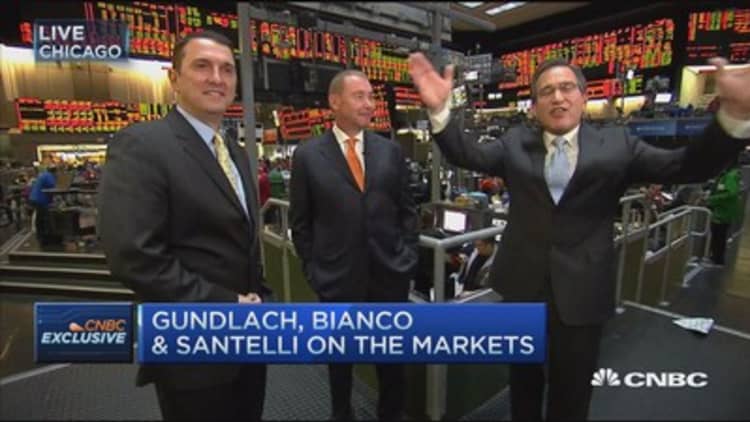Federal Reserve policy is creating "economic distortions" resulting in a transfer of wealth to the people who need it least, according to an analysis from a prominent Wall Street bond expert.
A stock buyback frenzy that has boosted the market and put money in the hands of those seeking short-term gains is but one of the less-desirable Fed benefits cited by BlackRock's Rick Rieder in a blog post on the firm's website.
"The global economy is witnessing a massive redistribution of wealth and income with borrowers, equity shareholders and short-term investors benefiting; and savers, bondholders and longer-term investors being placed at risk," wrote Rieder, chief investment officer of BlackRock's Fundamental Fixed Income division and co-head of Americas Fixed Income.
BlackRock is just the latest Wall Street voice to express concern over an environment in which companies are eschewing long-term investments in plants, infrastructure and jobs in favor of short-term moves like buybacks and dividend issuance aimed at pleasing deep-pocketed and vocal shareholders.
In a similar analysis a few days ago, Goldman Sachs strategists pointed out that companies have spent $2 trillion over the past five years on buybacks. Capital investment, meanwhile, has slumped from 29 percent of operating cash flow to 23 percent while dividends and buybacks surged to 36 percent.
Read MoreGoldman: Market's going nowhere for a year
Citigroup also has weighed in on the subject, pointing out in a note in April that companies in the have spent $4 trillion on buybacks over the past 10 years.
With its $4.65 trillion in assets under management, BlackRock's voice carries strong weight. Company CEO Larry Fink has issued several of his own warnings about the market's Fed-fueled short-term thinking.
Rieder's analysis notes that S&P 500 companies announced $133 billion in buybacks for April alone—a record—while the investment grade debt-to-equity ratio has jumped from 72 percent in 2010 to 85 percent now. In a separate report Wednesday, Dealogic said corporate bond volume issuance has hit a record $543.4 billion in 2015.
Read MoreOur $58T love affair with debt, in one crazy chart
Such trends, Rieder argued, are the result of "excessively accommodative monetary policy" from the Fed, which has exploded its balance sheet to $4.5 trillion and kept short-term interest rates near zero since late 2008 in an effort to improve economic activity, which nonetheless has remained below trend throughout.
While companies were using the cheap debt to shore up their balance sheets in the early post-financial crisis days, "we have increasingly seen debt used for stock buybacks and dividends ... in essence rewarding equity-holders at the (possible) expense of bondholders," Rieder said.
"Now, there is nothing wrong with stock buybacks and dividends per se, and indeed they can contribute to a very sensible corporate capital allocation strategy," he added. "But should this use of capital crowd out long-term capital expenditure (investment) in a firm's core business, or begin to threaten its credit quality, then it can become concerning. And this is what we are seeing today."
The Fed has stopped its monthly money-printing operation but continues to hold rates low. Market expectations are for an increase this year, probably in December but perhaps as soon as September, though some are doubting that as well. Jeff Gundlach at Doubleline on Wednesday said he doesn't think the Fed will tighten this year.
Until the Fed normalizes policy, Rieder warned that capital misallocations will persist.
"In the end, leveraging cycles eventually turn, policy evolves, and the threat of technological and competitive disruption should combine to force companies back to investing in their productive capacity," he said. "In the meantime, as we wait for the start of rate normalization, firms continue to play capital structure arbitrage, and the cost of waiting to lift off from 'emergency' interest rate levels grows."

